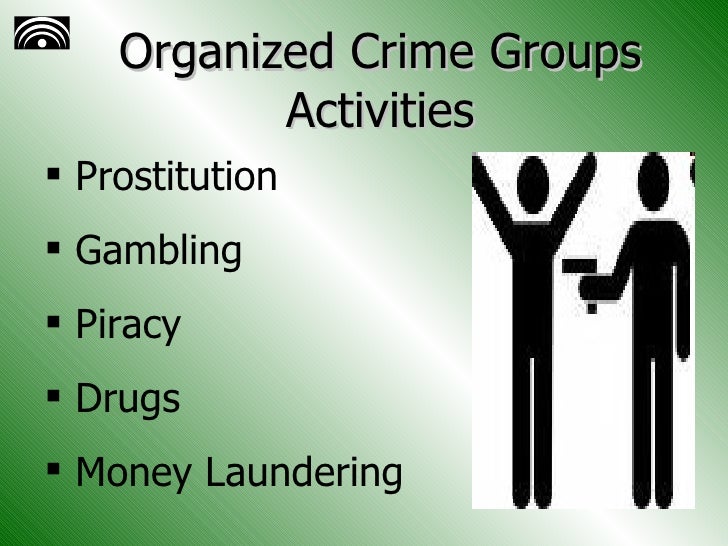ORGANIZED CRIME THREATENS NOW NOT ONLY THE USA BUT THE WORLD!
AXJ :: AXJ GLOBAL CATEGORY :: AXJ NEWS
Page 1 of 1
 ORGANIZED CRIME THREATENS NOW NOT ONLY THE USA BUT THE WORLD!
ORGANIZED CRIME THREATENS NOW NOT ONLY THE USA BUT THE WORLD!
ORGANIZED CRIME THREATENS NOW NOT ONLY THE USA BUT THE WORLD!

By Eric Mesi
Organized crime threatens multiple facets of the United States, including the economy and national security. In fact, the Organized Crime Council was reconvened for the first time in 15 years to address this continued threat. Organized crime has taken on an increasingly transnational nature, and with more open borders and the expansion of the Internet, criminals endanger the United States not only from within the borders, but beyond. Threats come from a variety of criminal organizations, including Russian, Asian, Italian, Balkan, Middle Eastern, and African syndicates. Policymakers may question whether the tools they have provided the federal government to combat organized crime are still effective for countering today’s evolving risks.
Organized crime could weaken the economy with illegal activities (such as cigarette trafficking and tax evasion scams) that result in a loss of tax revenue for state and federal governments. This is particularly of issue given the current state of the country’s economic health. Fraudulent activities in domains such as strategic commodities, credit, insurance, stocks, securities and investments could further weaken the already-troubled financial market.
On the national security front, experts and policymakers have expressed concern over a possible nexus between organized crime and terrorism. Despite the difference in motivation for organized crime (profit) and terrorism (ideology), the linking element for the two is money. Terrorists may potentially obtain funding for their operations from partnering directly with organized crime groups or modeling their profitable criminal acts. Even if organized crime groups and terrorist organizations do not form long-term alliances, the possibility of short-term business alliances may be of concern to policymakers.
In light of these developments, several possible issues for Congress arise. One issue centers on whether the evolving nature of organized crime requires new enforcement tools. Some policymakers have suggested that current laws may not be effective at countering present threats from organized crime. As organized criminals threaten American society from both within and outside U.S. borders, should Congress expand law enforcement’s extraterritorial jurisdiction to investigate and prosecute these criminals, and to what extent should Congress encourage multilateral—both domestic and international—crime fighting efforts?
Another possible issue for Congress concerns whether the resources that the federal government allocates to organized crime matters are adequate and appropriately allocated to counter the threats organized crime poses. Following the terrorist attacks of September 11, 2001, national priorities and federal resources shifted away from more traditional crime fighting—including that of organized crime—toward counterterrorism and counterintelligence. For instance, the number of federal agents actually working on organized crime matters and the number of organized crime cases opened in FY2004 decreased relative to levels before September 11, 2001.

By Eric Mesi
Organized crime threatens multiple facets of the United States, including the economy and national security. In fact, the Organized Crime Council was reconvened for the first time in 15 years to address this continued threat. Organized crime has taken on an increasingly transnational nature, and with more open borders and the expansion of the Internet, criminals endanger the United States not only from within the borders, but beyond. Threats come from a variety of criminal organizations, including Russian, Asian, Italian, Balkan, Middle Eastern, and African syndicates. Policymakers may question whether the tools they have provided the federal government to combat organized crime are still effective for countering today’s evolving risks.
Organized crime could weaken the economy with illegal activities (such as cigarette trafficking and tax evasion scams) that result in a loss of tax revenue for state and federal governments. This is particularly of issue given the current state of the country’s economic health. Fraudulent activities in domains such as strategic commodities, credit, insurance, stocks, securities and investments could further weaken the already-troubled financial market.
On the national security front, experts and policymakers have expressed concern over a possible nexus between organized crime and terrorism. Despite the difference in motivation for organized crime (profit) and terrorism (ideology), the linking element for the two is money. Terrorists may potentially obtain funding for their operations from partnering directly with organized crime groups or modeling their profitable criminal acts. Even if organized crime groups and terrorist organizations do not form long-term alliances, the possibility of short-term business alliances may be of concern to policymakers.
In light of these developments, several possible issues for Congress arise. One issue centers on whether the evolving nature of organized crime requires new enforcement tools. Some policymakers have suggested that current laws may not be effective at countering present threats from organized crime. As organized criminals threaten American society from both within and outside U.S. borders, should Congress expand law enforcement’s extraterritorial jurisdiction to investigate and prosecute these criminals, and to what extent should Congress encourage multilateral—both domestic and international—crime fighting efforts?
Another possible issue for Congress concerns whether the resources that the federal government allocates to organized crime matters are adequate and appropriately allocated to counter the threats organized crime poses. Following the terrorist attacks of September 11, 2001, national priorities and federal resources shifted away from more traditional crime fighting—including that of organized crime—toward counterterrorism and counterintelligence. For instance, the number of federal agents actually working on organized crime matters and the number of organized crime cases opened in FY2004 decreased relative to levels before September 11, 2001.
 Similar topics
Similar topics» AXJ GPS : WE ARE NOW FRANCHISING WORLD WIDE! JOIN US!
» AXJ OPEN SECRETS : NOW AVAILABLE WORLD WIDE! JOIN US!
» AXJ GLOBAL NEWS AND WORLD EVENTS NOW FRANCHISED!
» AXJ OPEN SECRETS : NOW AVAILABLE WORLD WIDE! JOIN US!
» AXJ GLOBAL NEWS AND WORLD EVENTS NOW FRANCHISED!
AXJ :: AXJ GLOBAL CATEGORY :: AXJ NEWS
Page 1 of 1
Permissions in this forum:
You cannot reply to topics in this forum|
|
|
